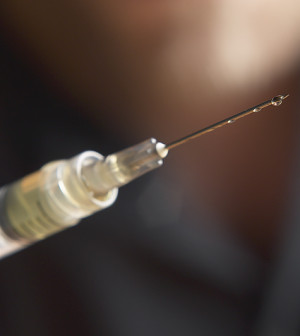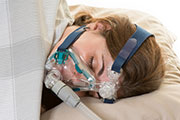- USDA Gets Tougher on Salmonella in Raw Breaded Chicken Products
- Fragments of Bird Flu Virus Found in 1 in 5 Milk Samples
- Clients Got HIV Through ‘Vampire Facial’ Microneedling Treatments
- Take the Stairs & Step Up to Longer Life
- ‘Drug Take Back Day’ is Saturday: Check for Leftover Opioids in Your Home
- Loneliness Can Shorten Lives of Cancer Survivors
- A Stolen Dog Feels Like Losing a Child, Study Finds
- Healthier Hearts in Middle Age Help Black Women’s Brains Stay Strong
- Better Scans Spot Hidden Inflammation in MS Patients
- Which Patients and Surgeries Are ‘High Risk’ for Seniors?
Sleep Apnea Treatment May Help Lower Diabetes Risk for Some


Treating sleep apnea may help people with slightly elevated blood sugar levels lower their risk of developing diabetes, according to a new study.
“Assessment of sleep apnea should be considered in patients at high risk for diabetes and cardiovascular disease, since our study shows that treatment of sleep apnea can reduce these risks,” the study’s senior author, Dr. Esra Tasali, an assistant professor of medicine at the University of Chicago, said in a university news release.
People with higher-than-normal blood sugar levels who don’t yet have diabetes are considered to have pre-diabetes. This condition affects about 57 million Americans, according to the researchers.
Many people with pre-diabetes also have untreated sleep apnea — a sleep disorder that causes the upper airway to close repeatedly during the night, disrupting sleep and temporarily reducing oxygen levels. Like diabetes, sleep apnea is common among overweight and obese people. It’s also linked with greater risk for heart disease and diabetes, the researchers said.
Left unchecked, pre-diabetes can progress to type 2 diabetes, which is associated with a number of serious complications, including damage to the blood vessels, eyes, kidneys and nerves.
But, researchers found that using a continuous positive airway pressure (CPAP) device to treat sleep apnea for eight hours a night seems to help people with pre-diabetes improve their blood sugar control and reduce their risk of diabetes.
The study involved 39 middle-aged volunteers who were overweight or obese. All of the participants had pre-diabetes and sleep apnea. The volunteers were divided into two groups. The first group of 26 people was randomly assigned to undergo two weeks of CPAP treatment for eight hours a night.
This device works by blowing a steady stream of air through a tube and a face mask into the person’s airway while they sleep. This constant air pressure helps people with sleep apnea breathe better by keeping their airway open.
The second group of 13 people received an inactive placebo pill taken before bedtime for two weeks.
All of the participants spent each night in a sleep laboratory and were monitored with all-night sleep recordings.
At the beginning and end of each treatment period, the participants underwent glucose tolerance tests to assess their blood sugar levels.
By the end of the study, participants who received the CPAP treatment had improved blood sugar levels and insulin sensitivity, compared to the placebo group. On average, the CPAP group had lower levels of stress hormones and lower blood pressure than those who didn’t receive the CPAP treatment, the study found.
The study results were published online recently in the American Journal of Respiratory and Critical Care Medicine.
“Our study showed that CPAP in patients with pre-diabetes can lower their risk of progressing to diabetes when CPAP is used for eight hours, a full night’s sleep,” the study’s lead author, Dr. Sushmita Pamidi, a former fellow at the University of Chicago, said in the news release. Pamidi is now on the faculty at McGill University in Montreal, Canada.
“Although eight hours of CPAP per night can be difficult to achieve in real-life, our results should provide a strong incentive for anyone with sleep apnea, especially pre-diabetic individuals, to improve adherence to their treatment for cardio-metabolic risk reduction,” Pamidi said.
More information
The U.S. National Heart, Lung, and Blood Institute has more about sleep apnea.
Source: HealthDay
Copyright © 2024 HealthDay. All rights reserved.









